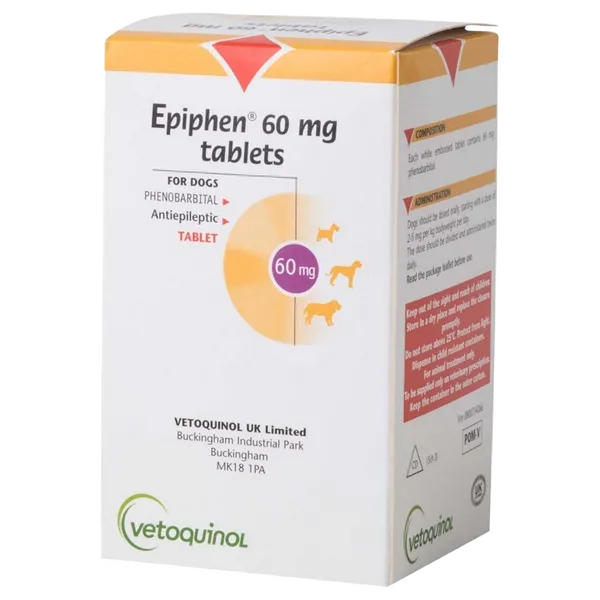Contra-indications:
- Not for use in pregnant animals.
- Do not administer to animals with impaired hepatic function.
- Do not use in cases of hypersensitivity to the active substance(s), to any other barbiturates or to any of the excipients.
- Do not use in animals with serious renal and/or cardiovascular/respiratory disorders.
Special warnings for each target species:
The decision to start antiepileptic drug therapy with phenobarbital should be evaluated for each individual case and depends on number, frequency, duration and severity of seizures in dogs.
To achieve successful therapy, administration of tablets should occur at the same time(s) each day and should be co-ordinated with feeding times in a consistent manner. Withdrawal or transition from other types of antiepileptic therapy should be made gradually to avoid precipitating an increase in the frequency of seizures. Some dogs are free of epileptic seizures during the treatment, but some dogs show only a seizure reduction, and some dogs are considered to be non-responders.
Special precautions for use in animals:
Caution is recommended in animals with:
- Impaired hepatic and renal function
- Hypovolemia, anaemia and
- Cardiac or respiratory dysfunction
The chance of hepatotoxic side effects can be diminished or delayed using an effective dose that is as low as possible. Monitoring of hepatic parameters is recommended in case of a prolonged therapy. It is recommended to assess the clinical pathology of the patient 2-3 weeks after start of treatment and afterwards every 4-6 months, e.g. measurement of hepatic enzymes and serum bile acids. Phenobarbital may increase the activity of serum alkaline phosphatase and transaminases, which may demonstrate non-pathological changes but could also represent hepatotoxicity. Treating dogs with phenobarbital may lower TT4 or FT4 serum levels; treatment with thyroid hormone replacement should only be started if there are clinical signs of the disease. In stabilised epileptic patients, it is not recommended to switch between phenobarbital formulations without caution.
Special precautions to be taken by the person administering the veterinary medicinal product to animals:
- People with known hypersensitivity to phenobarbital or other barbiturates should avoid contact with this veterinary medicinal product.
- It is advisable to wear disposable gloves when handling the product to reduce skin contact.
- Phenobarbital is a teratogen and developmental neurotoxicant and transfers to breast milk.
- The product should not be administered by pregnant women, women intending to become pregnant or whose pregnancy status is unknown, as well as lactating women.
- Ingestion of Phenobarbital can cause neurotoxicity which may prove fatal. Take utmost care that children do not come into any contact with the product.
- To prevent accidental ingestion of tablets, the container should be closed immediately after withdrawing the required number of tablets for one administration. Part tablets should be placed back into the container and used at the next administration, as even part tablets pose a health risk to small children if ingested.
- The container should be stored in a safe place out of the sight and reach of children.
- In case of accidental ingestion, seek medical advice immediately and show the package leaflet or the label to the physician.
- Wash hands thoroughly after use.
Adverse reactions (frequency and seriousness):
Ataxia, somnolence, listlessness and dizziness may occur rarely at the start of treatment. These effects may persist. Paradoxical hyperexcitability may occur rarely, particularly after first starting therapy. Sedation and ataxia may become significant concerns as serum levels reach the higher end of the therapeutic range. Polyphagia, polyuria and polydipsia have been reported rarely, usually transitory. Hepatotoxicity may develop very rarely at doses over 20mg/kg/day or when serum Phenobarbital levels are high. Phenobarbital can have deleterious effects on stem cells from bone marrow, immunotoxic pancytopenia and/or neutropenia and anaemia may occur very rarely. Superficial necrolytic dermatitis may occur very rarely. Hypoalbuminaemia was rarely reported. In very rare cases, change of behaviour such as aggression was reported. If adverse effects are severe, it is recommended to decrease the daily dose.
Use during pregnancy, lactation or lay:
Use only according to the benefit-risk assessment by the responsible veterinarian. Phenobarbital is excreted in small amounts in breast milk and during nursing pups should be monitored carefully for undesired sedative effects. The safety of the veterinary medicinal product has not been proven during pregnancy or lactation in dogs.
Overdose (symptoms, emergency procedures, antidotes):
Overdosage may result in coma, severe respiratory and cardiovascular depression, hypotension and shock leading to renal failure and death. Following recent ingestion of an overdose, the stomach may be emptied by lavage. Management involves intensive symptomatic and supportive therapy, with particular attention to cardiovascular, respiratory and renal functions and electrolyte balance.

